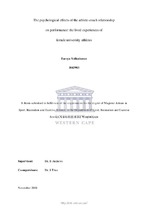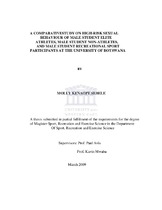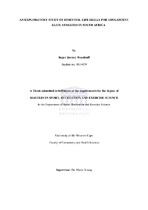| dc.description.abstract | Coaches have been found to have a remarkable influence on the physical and psychological development on their athletes and that their main responsibility is to help their athletes perform at their maximum level and reach goals that they could not attain on their own. Coaches are responsible for developing athletes’ mental, physical, technical, and tactical abilities, and in addition to all of these responsibilities, they are also expected to win. The coach-athlete relationship can thus be regarded as the conveying of technical skills and mentoring from coach to athlete. Despite the responsibilities of a coach, the athlete-coach relationship is fundamental in the process of coaching because its nature is likely to determine the athlete’s satisfaction, self-esteem and performance accomplishments.
The aim of this study was to investigate female university track and field athletes’ lived experiences within the athlete-coach relationship to gather psychological effects relating to performance. The objectives were to explore the lived experiences of female university athletes within the athlete-coach relationship, investigate the psychological effects, and explore the impact it has on performance within the athlete-coach relationship. The researcher adopted the qualitative research method approach using the phenomenology design to explore and obtain a better understanding into the psychological effects of the athlete-coach relationship on an athletes’ performance. Semi-structured interviews were used to gather data. Following the interviews, all data was analyzed using the 3+1C’s conceptualized model as the theoretical framework. This model was used as it defines the coach-athlete relationship as a situation in which coaches and athletes’ closeness, commitment, and complementarity are co-orientated. The 3+1C’s model explored the athlete-coach relationship from the athlete’s perspective which elicited positive and negative psychological and performance effects within the athlete-coach dyad. The research findings of this thesis it can be concluded that the behaviours of coaches have an influence on female athletes’ psychological state as well as performance; and found that when coaches and athletes work together to achieve goals the relationship is more likely to be successful and the athlete is more likely to achieve goals. Furthermore it was concluded that affective emotional feelings of female University athletes are important in developing an effective athlete-coach relationship and facilitating positive psychological effects. | en_US |




